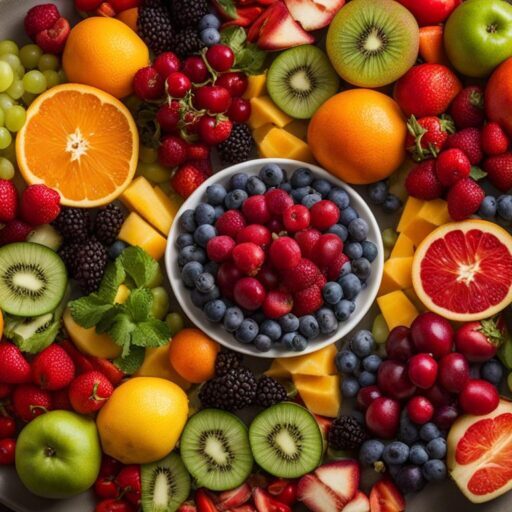Welcome to an introduction to the epigenetic power of apples! Epigenetics and nutrition have long been subjects of interest in the health and wellness community. Recent research has uncovered the potential of certain fruits to act as natural epigenetic modifiers, influencing gene expression and offering a bounty of health benefits.
There are a number of nutrient-rich fruits that are epigenetic superfoods, with studies further exploring their remarkable properties. In this article, we will delve into the research on Apples and discover how they can positively impact our health.

Key Takeaways:
- Epigenetic fruits are a group of nutrient-rich fruits that have the potential to influence gene expression in our bodies. These fruits act as natural epigenetic modifiers and offer numerous health benefits.
- Apples are a rich source of phytochemicals, such as polyphenols and flavonoids, which can influence epigenetic mechanisms and gene expression.
- Regular consumption of apples may offer epigenetic benefits, including improved antioxidant activity, anti-inflammatory effects, and regulation of gene expression related to cancer prevention, cardiovascular health, and metabolic processes.
- The epigenetic benefits of apples are attributed to their ability to alter DNA methylation patterns and histone modifications, which can impact gene expression and cellular processes.
- Different apple varieties contain varying levels of beneficial phytochemicals, with deeper red or purple hues generally indicating higher concentrations.
- Incorporating one or two apples per day into a balanced diet may provide significant epigenetic benefits due to their phytochemical content and potential to positively influence gene expression.
What is Epigenetics?
Have you ever wondered why identical twins can develop different diseases or traits over time, despite sharing the same DNA? The answer lies in epigenetics – a fascinating field that explores how environmental factors can influence gene expression without altering the underlying genetic code.
What are Epigenetic Fruits?
Epigenetic fruits are a unique category of fruits that possess compounds capable of influencing gene expression in our bodies. Unlike regular fruits, epigenetic fruits have been found to have specific properties that can positively impact our cellular health. These fruits contain natural epigenetic modifiers, which can regulate the activity of our genes and potentially lead to various health benefits.
The compounds present in epigenetic fruits have the ability to influence the way our genes are expressed. Gene expression refers to the process by which the information encoded in our genes is used to create proteins and carry out various cellular functions. By modulating gene expression, epigenetic fruits can potentially enhance cellular health and optimize our body’s overall functioning.
Apples and Regulating Gene Expression
Compounds found in apples, such as quercetin and phloridzin, have been shown to regulate the expression of genes involved in various cellular processes, including cell growth, differentiation, and apoptosis (programmed cell death). By modulating these processes, apples may help prevent or slow the progression of certain diseases, such as cancer.

Apples and their Phytochemicals
Apples are a widely consumed, rich source of phytochemicals, and epidemiological studies have linked the consumption of apples with reduced risk of some cancers, cardiovascular disease, asthma, and diabetes. In the laboratory, apples have been found to have very strong antioxidant activity, inhibit cancer cell proliferation, decrease lipid oxidation, and lower cholesterol. Apples contain a variety of phytochemicals, including quercetin, catechin, phloridzin and chlorogenic acid, all of which are strong antioxidants. The phytochemical composition of apples varies greatly between different varieties of apples, and there are also small changes in phytochemicals during the maturation and ripening of the fruit. Storage has little to no effect on apple phytochemicals, but processing can greatly affect apple phytochemicals.
…Of the papers reviewed, apples were most consistently associated with reduced risk of cancer, heart disease, asthma, and type II diabetes when compared to other fruits and vegetables and other sources of flavonoids. Apple consumption was also positively associated with increased lung function and increased weight loss. Partially because of such strong epidemiological evidence supporting the health benefits in apples, there is increasing research using animal and in vitro models that attempts to more clearly explain these health benefits.(Boyer 2004)
Polyphenols Like Quercetin
Apples are a powerhouse of polyphenols, with one of the key compounds being quercetin. Polyphenols are a group of plant-based antioxidants that have been studied for their potential health benefits. Quercetin, in particular, has been shown to have anti-inflammatory and immune-modulating properties.
Quercetin has been extensively studied for its potential epigenetic effects, and has been shown to affect DNA methylation, which is a critical mechanism of epigenetic modification. It can influence the methylation patterns of genes involved in cancer, cardiovascular diseases, and other conditions.
Quercetin in Apples
Quercetin is mainly found in tea, apples and onions. All of these foods contain other biologically active components in addition to quercetin, and so some of the effects observed for tea described above could be partly ascribed to quercetin, and similarly for onions and apples. Regular consumption of the latter, for example, reduces the risk of type 2 diabetes according to a recent meta‐analysis (Guo et al. 2017). As quercetin is one of the most biologically active polyphenols in vitro, there have been several human intervention studies on the effects of pure quercetin. When given in the 4′‐O‐glucoside form, which is highly bioavailable, platelet aggregation and thrombus formation were reduced and coincided with the appearance of quercetin (metabolites) in plasma (Hubbard et al. 2004). When given chronically over 4 weeks, quercetin (as 3‐O‐glucoside, also bioavailable) improved endothelial function and reduced inflammation (Dower et al. 2015a), but did not affect flow‐mediated dilation or insulin resistance (Dower et al. 2015b). When given as aglycone (no sugars attached), which is much less bioavailable than the forms present in food (Shi & Williamson 2015), quercetin as a supplement decreased plasma uric acid in mildly hyperuricaemic males over a period of 4 weeks (Shi & Williamson 2016), but did not affect blood pressure in normal weight volunteers (Conquer et al. 1998; Egert et al. 2010b), platelet aggregation or serum cholesterol and triglyceride (Conquer et al. 1998), nor protect against oxidative stress after exercise (Nieman et al. 2007; McAnulty et al. 2008). When given acutely, quercetin reduced plasma endothelin‐1 (Loke et al. 2008), reduced blood pressure in overweight volunteers but only of a certain genotype (Egert et al. 2010a), but did not reduce urinary F2‐isoprostanes (Loke et al. 2008), nor blood pressure in normal weight volunteers (Egert et al. 2010b). When given in the form of onion skin extract, quercetin did not affect systemic inflammation in overweight women (Kim & Yim 2016), post‐prandial blood pressure, endothelial function, serum leptin nor adiponectin in overweight adults (Brull et al. 2016, 2017). These various studies suggest that quercetin exerts some effects in humans but the exact effect is highly dependent on the individual’s metabolic and genetic status, and on the form given. As many of the studies gave relatively high doses, at this stage, more research is required to define the effect of quercetin from dietary sources. (Williamson 2017)
Prebiotic Effects and Microbiome Benefits
In addition to their apples’ polyphenol content, apples also contain prebiotic fibers that can nourish the beneficial bacteria in your gut. Prebiotics are non-digestible fibers that stimulate the growth and activity of certain microbes in the gut, promoting a healthy microbiome. By incorporating apples into your diet, you can support the balance of your gut bacteria and potentially improve digestive health.
Incorporating Apples Into Your Diet
Its one thing to know facts, but the important thing is to act on what we know.
To fully experience their health benefits, apples should enjoyed a as part of a balanced diet. Aim for at least 2-3 servings of fruit per day to ensure an adequate intake of their beneficial compounds. You can enjoy fruit fresh, frozen, or even dried.
Apple Recipes and Ideas
There are many ways you can incorporate apples into your diet to harness their epigenetic power:
- Enjoy them as a snack on their own
- Add sliced apples to your salads for a refreshing crunch
- Incorporate apples into your smoothies for added fiber and nutrients
- Use apples as a natural sweetener in baked goods
By including apples in your daily meals and snacks, you can reap the benefits of their polyphenols, prebiotic fibers, and support your gut health.
Here are a few delicious and easy ideas:
Apple Smoothies
Blend a whole apple (skin on) with your favorite smoothie ingredients, such as Greek yogurt, spinach, and almond milk, for a nutrient-packed breakfast or snack.
Baked Apples
Core and stuff apples with a mixture of nuts, dried fruit, and spices, then bake them for a warm and comforting dessert or snack.
Apple Salads
Toss sliced apples into your salads for a crisp, refreshing addition. They pair particularly well with greens, nuts, and cheese.

Buying and Storage Tips
When purchasing epigenetic fruits, look for organic varieties whenever possible to minimize exposure to pesticides and chemicals. Look for fruits that are firm, vibrant in color, and free from bruising or damage. To extend their shelf life, store them properly in the refrigerator. However, keep in mind that some fruits, like bananas, are best kept at room temperature.
FAQ


